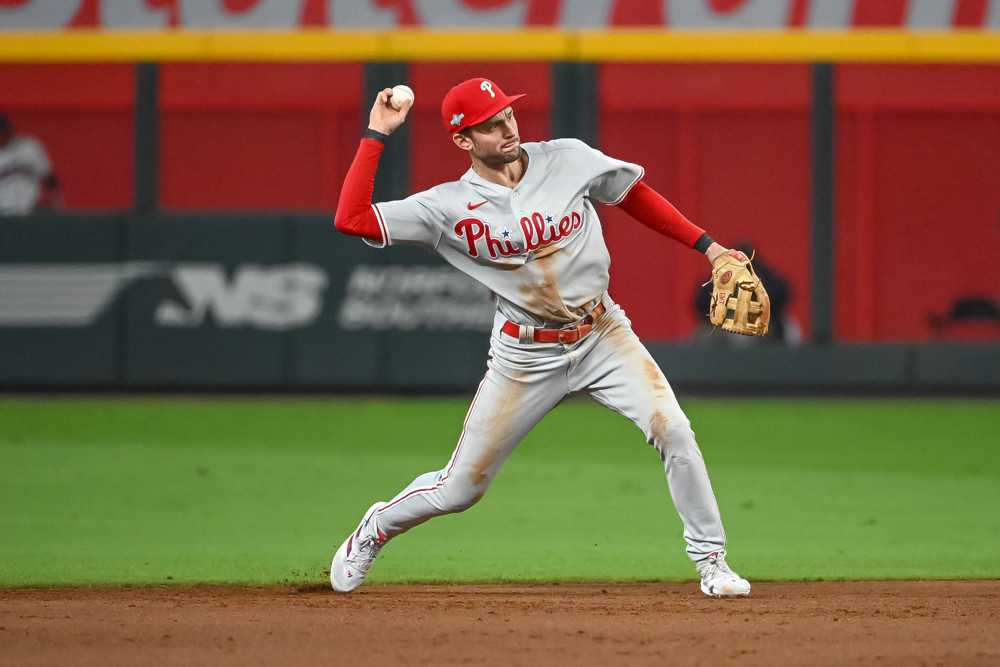
Trea Turner’s defensive performance is crucial for the Phillies in 2024
Prior to Game 2 of the 2023 NLCS at Citizens Bank Park against the Arizona Diamondbacks, a national reporter asked Philadelphia Phillies shortstop Trea Turner about his work in the field, beginning his question by referring to the shortstop as “such an accomplished defensive player.”
Turner, very self-aware, went on to give a lengthy answer about his process and work with infield coach Bobby Dickerson, but only after acknowledging the elephant in the room.
“Well, this year not so much,” Turner said bluntly after what was, by just about any metric, the worst defensive regular season of his career.
In the first season of an 11-year/$300 million deal, Turner finished with -12 defensive runs saved, the fifth-worst mark of any qualified defender in the sport. In terms of more traditional metrics, Turner’s .960 fielding percentage was also the fifth-worst in baseball. He led all defenders with 23 errors. Outside of a game-saving play against the Atlanta Braves in NLDS Game 1, it was a disastrous season in the field for Turner.
Turner has never been a Gold Glove-caliber defender, so the Phillies didn’t sign him expecting a Jimmy Rollins-level output in the field. But in the two years prior to joining the Phillies — which he split with the Washington Nationals and Los Angeles Dodgers — Turner posted zero defensive runs saved. He posted zero outs above average as well between 2021 and 2022, as opposed to -4 in 2023. In the four full seasons prior to joining the Phillies, Turner averaged 13 errors per year, 10 less than the amount he had in 2023.
When Turner was acquired by the Dodgers in July of 2021, he played second base for the remainder of the season, because Corey Seager was entrenched at shortstop. Over 436 2/3 innings at second base, Turner graded out well defensively, posting three defensive runs saved and two outs above average. After Seager left to sign with the Texas Rangers following the 2021 campaign, Turner shifted back to his natural position of shortstop. He wanted to play shortstop, and his offensive profile is impressive enough that there were always going to be multiple teams willing to let him do so when he became a free agent.
Still, no one believed when Turner signed with the Phillies for 11 years that he would spend the entirety of that time at shortstop. He probably doesn’t have the arm strength to play third base, and an early-career experiment in center field with the Nationals didn’t go well. So eventually, Turner is probably going to be the primary second baseman for the Phillies.
Eventually won’t be in 2024, however. While Bryson Stott is a natural shortstop, he was a Gold Glove finalist in his first full season playing second base. Phillies president of baseball operations Dave Dombrowski touted Stott’s excellent work at second base and the chance for Turner to work more extensively with Dickerson this spring as a reason why the Phillies weren’t flipping their middle infielders for 2024.
“I think Trea Turner will be better for us defensively next year,” Dombrowski said during his year-end press conference in late-October. “He made more errors than he normally does. Of course, he made some really good plays too.
“But again, I think when you have a situation due to the organization, having a chance to work with [infield coach] Bobby Dickerson from the very beginning of Spring Training, and not just your first time. He wasn’t in Spring Training because of the World Baseball Classic the whole time last year. I think he’ll be a more consistent defensive player than he was this year.”
The good news for the Phillies — both from a defensive perspective and just as a club with a decade more invested in the player — is that there wasn’t any real evidence of Turner’s athleticism declining in 2024. More often, his defensive miscues came on balls that he got to and either booted trying to field or fielded cleanly and then made a bad throw. Whether the defensive miscues were concentration lapses, thinking too much in the field or some combination, they are easier to correct than if he just didn’t have the range to play the position anymore.
Turner being just slightly below average defensively — as opposed to being one of the worst overall defenders in baseball — would be one way the Phillies could be a better team in 2024 than 2023, both in the regular season and playoffs.
Leave a Reply